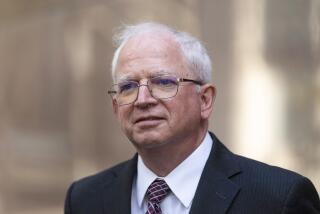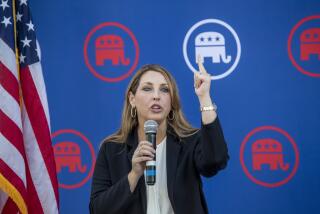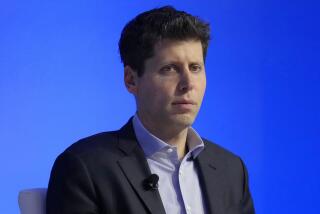Man Admits Role in Plot to Conceal Election Donations
- Share via
Michael B. Altman, a defendant in an election law violation case involving pro-Israel activist Michael R. Goland, pleaded guilty in federal court Monday to a misdemeanor count of aiding Goland in making illegal campaign donations.
Altman’s sentencing was set for March 27 in U.S. District Court in Los Angeles, one month after the scheduled start of the Goland trial. Assistant U.S. Atty. George Newhouse Jr. told Judge Ronald S. W. Lew that Altman had agreed to cooperate with the government and testify at Goland’s trial.
The maximum sentence Altman could receive would be a year in jail and a $360,000 fine.
Altman, 42, a Sherman Oaks insurance broker, said under questioning by Lew that he was given money by Goland to contribute to an advertising campaign on behalf of an American Independent Party candidate for the U.S. Senate in 1986. The aim was to siphon votes away from Republican candidate Ed Zschau, thus improving the reelection chances of the Democratic incumbent, Alan Cranston.
Cranston was outspokenly pro-Israel in the campaign. Zschau was more ambivalent on Middle Eastern questions.
By laundering the money for Goland, Altman agreed he had involved himself in a violation of election laws that require that a person giving money to a candidate be identified as the donor.
Goland and two other associates have pleaded not guilty to four felony counts in the same case.
Newhouse told the judge that Altman, like Goland, was a member of a group named the Young American Political Action Committee that backed candidates deemed to be supportive of Israel.
In the summer of 1986, Newhouse said, Goland gave Altman $100,000 from a stock account to use for an unspecified purpose, and later told him to give $90,000 of it to a firm known as Greenstripe Media to organize the advertising campaign for American Independent candidate Edward B. Vallen. Goland’s construction firm, Balboa, also wrote a $30,000 check for the advertising campaign.
Later, 55 smaller donors, including Altman, were recruited to contribute to the advertising campaign as a cover, Newhouse said. The advertising firm gave these contributions to Altman after the election. He gave the money to Goland, who reimbursed the smaller donors.
Altman told Judge Lew he agreed with this summary of the case. He said he had decided to plead guilty because he had done what he was charged with doing, and wanted to tell the truth at the trial.
In answer to a reporter’s question, Altman said that Cranston had at one point in the summer of 1986 addressed a luncheon meeting of the Young American Political Action Committee, but that the senator had known nothing about the contributions to Vallen.
Altman’s attorney, Harland Braun, said his client did not realize he was breaking the law when he laundered the money.
“My client was doing a favor for a friend,” Braun said. “He’s not a political activist. . . . He regrets it now.”
“Do I ever!” exclaimed Altman.
Vallen wound up receiving 109,916 votes in the election--about 5,000 more than Cranston’s slim victory margin over Zschau, then a congressman. Vallen’s television commercials portrayed Vallen as a better conservative than Zschau.
More to Read
Get the L.A. Times Politics newsletter
Deeply reported insights into legislation, politics and policy from Sacramento, Washington and beyond. In your inbox twice per week.
You may occasionally receive promotional content from the Los Angeles Times.









